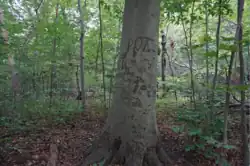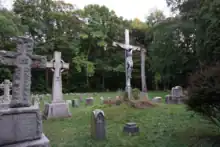| Seminary Woods | |
|---|---|
 One of the beech trees located in Seminary Woods with vandalism etched along its trunk. (St.Francis, Wisconsin) | |
| Location | Saint Francis de Sales Seminary |
| Nearest city | St. Francis, Wisconsin |
| Coordinates | 42°58′55″N 87°52′16″W / 42.982°N 87.8711°W |
| Created | 1855 |
| Operated by | Saint Francis de Sales Seminary |
| Website | http://www.mkeconservancy.org/seminary-woods.html |
Seminary Woods is a historic woodland in St. Francis, Wisconsin, on the grounds of Saint Francis de Sales Seminary. It is one of the last surviving beech-maple mesic forests in Wisconsin. The forest was founded in 1855 when the seminary moved to St. Francis from Milwaukee and the land that was originally purchased by the Lake Drive Franciscan Sisters became part of the newly established seminary. The forest consists of 68 acres and is located near Lake Michigan. It attracts attention from naturalists for the forest's beech-maple composition and wild flowers that bloom in the spring. A striking feature of the forest is the seminary's cemetery that lies hidden among the trees.
History
Although the woods lie on seminary property, the forest was first owned by the Sisters of St. Francis of Assisi in 1833. The land was acquired by the sisters from the Potawatomi Indians living in the area at the time. It was not until 1855 that Saint Francis de Sales Seminary was built and the forest became part of its property.[1] The forest has survived colonization and urbanization because its natural beauty led it to be used as a place for reflection by members of the seminary.
Natural history

The forest obtained its distinct beech-maple forest from soil deposits made by glacial movement 11,000 years ago. Several species of wildflowers, wildlife, and trees are spotted in the forest. Mature trees found in the forest include, basswood, sugar maple, beech, red oak, and paper birch. The forest also has a small stream that flows into nearby Lake Michigan. Wildflowers include, trillium, white trout lily, yellow trout lily, bloodroot, the endangered blue stemmed goldenrod, and hepatica. Wildlife found in the area include great horned owls, white tailed deer, coyotes, and migratory birds.[2]
| Common name | Scientific name |
|---|---|
| American beech | Fagus grandifolia |
| American basswood | Tilia americana |
| Sugar maple | Acer saccharum |
| Red oak | Quercus rubra |
| Paper birch | Betula papyrifera |
| Common name | Scientific name |
|---|---|
| Great horned owl | Bubo virginianus |
| White-tailed deer | Odocoileus virginianus |
| Common name | Scientific name |
|---|---|
| Tri flower | Trillium sp. |
| White trout lily | Erythronium albidum |
| Yellow trout lily | Erythronium americanum |
| Hepatica or liverwort | Hepatica sp. |
| Bloodroot | Sanguinaria sp. |
| Blue-stemmed goldenrod | Solidago caesia |
Invasive species
The Wisconsin Department of Natural Resources has declared Seminary Woods an area in need of protection from invasive species because of its natural environment and historical significance.[3] Although the forest does contain invasive species, they are low in number.
| Common name | Scientific name |
|---|---|
| Common buckthorn | Rhamnus cathartica |
| Garlic mustard | Alliaria petiolata |
| Bell's honeysuckle | Lonicera × bella |
Structural remains
In the forest are the remains of previous structures, a grotto and the cemetery that is a final resting place for individuals who were affiliated with the seminary
Seminary cemetery

The cemetery is located towards the middle of the forest. Multiple pathways within the forest lead to the cemetery. The cemetery contains burials of sisters of St. Francis, archbishops, and children from St. Aemilian's orphanage.[4]
Our Lady of Lourdes Grotto

The 10-foot (3 m) grotto found in the forest near the cemetery honors Our Lady of Lourdes and was built in 1894 by Paul Dobberstein.[5]
References
- ↑ "Saving Seminary Woods". Shepherd Express. October 1, 2008. Retrieved December 11, 2017.
- ↑ Milwaukee County LWRMP (April 2006). "Chapter 2. Physical Description of Milwaukee County and Natural Resource Initiatives" (PDF). gomilwaukee.
- ↑ Conservancy, Milwaukee Area Lanc. "Milwaukee Area Land Conservancy - Seminary Woods". www.mkeconservancy.org. Retrieved December 11, 2017.
- ↑ "St. Aemilian's Orphan Asylum/Home". Milwaukee County Historical Society. 2015-03-03. Retrieved 2018-05-02.
- ↑ "St. Francis Seminary Woods Cemetery, Burials, Interments Milwaukee County Wisconsin - Milwaukee County Wisconsin". www.linkstothepast.com. Retrieved 2017-12-11.